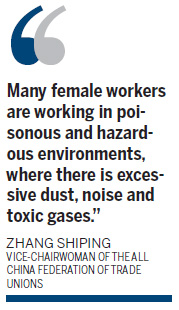Society
Union proposes rules to protect female workers
By Chen Xin (China Daily)
Updated: 2011-03-08 08:20
 |
Large Medium Small |
BEIJING - The country's top trade union organization on Monday called for better protection for female employees, who often are employed in unhealthy environments and lack basic protections.
| ||||
"Many female workers are working in poisonous and hazardous environments, where there is excessive dust, noise and toxic gases," she said. "They do not receive protection or regular health examinations."
Labor-intensive and small enterprises with old facilities and outdated technology can often be the sites of accidents such as poisonings, explosions and fires, she said.
Zhang said female employees ought to enjoy other rights as well. Pregnant workers, for instance, should be exempt from having to perform specific dangerous tasks and should be entitled, upon returning to their jobs after having given birth, to make the same salaries they had received before.
"The majority of female workers in the clothing industry do not receive the statutory 90-day maternity leave," she said. "Many are even dismissed during their pregnancies or breast-feeding periods."
Yu Wenlan, an occupational health expert with the Chinese Center for Disease Control and Prevention, told China Daily that only 10 percent of employees in China now receive regular occupational health services. Such benefits are not available for the many women workers in China who do not have a stable job.
Ding Dajian, head of the All China Federation of Trade Unions' women workers' affairs department, said most small and medium-sized enterprises in China do not provide occupational health services to women workers. For example, among the 2,110 corporations surveyed by the All China Federation of Trade Unions in 2009, about 55 percent said they do not offer regular health checks to female employees.

"The incidence of gynecological diseases such as breast and cervical cancers among female workers is on a rise in recent years because of the lack of early discovery and intervention," she said.
Ding said the All China Federation of Trade Unions has called on lawmakers and the labor sector to quickly revise the Female Workers' Labor Protection Regulation, which was laid out by the State Council, or the Cabinet, 22 years ago.
She said one thing the regulation does not govern is the use of potentially dangerous chemical materials that have grown more common with the invention of new technologies.
Ding called for the revised code to clearly define which jobs pregnant workers should not be made to do, order all businesses to offer regular health examinations, and prolong the 90 days now given for maternity leave to 14 weeks.
Liu Li, who runs a foot massage store in Xiamen, East China's Fujian province, said it is common for employers in her industry to not sign contracts with masseuses, the majority of whom are female.
She said a pregnancy will often lead to unemployment for masseuses and that asking for one month of leave from such a job is akin to submitting one's resignation.
Speaking at the news conference, Li Binsheng, a member of the All China Federation of Trade Unions secretariat, said women workers could better protect their rights by establishing more committees to represent their interests in trade unions and by making a greater use of collective bargaining.
By September 2010, China had set up more than 1.5 million such committees in 77.6 percent of the trade unions. The All China Federation of Trade Unions plans to extend the organizations to all of the trade unions in the country by 2013.
Li said the proposed collective contracts would lay out rules concerning female employees' labor rights, special care during their menstrual periods, pregnancies, breast-feeding periods and their rights to promotions and training.
By the end of 2010, about 714,000 contracts concerning women workers had been signed in China. Their terms regulate 1.24 million enterprises and more than 54 million workers, according to figures from the All China Federation of Trade Unions.
Wei Tian contributed to this story.



